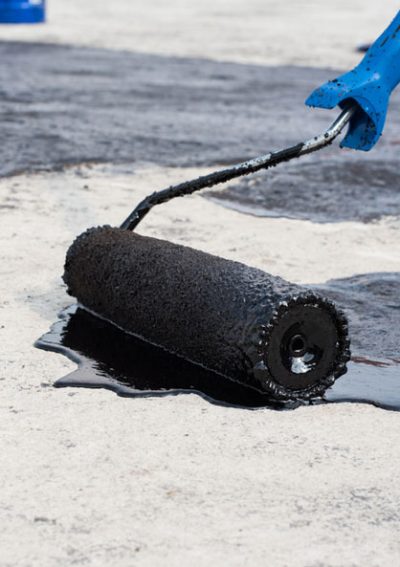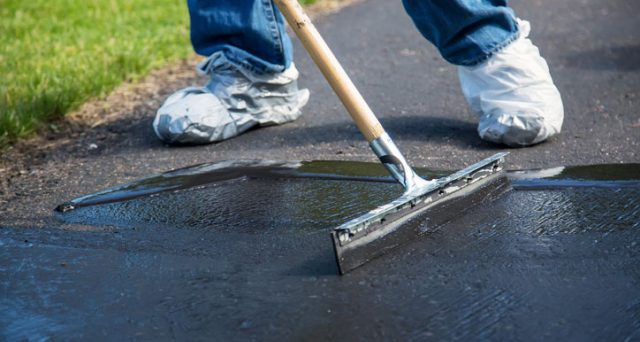Coal Tar Sealant Lawsuits
Eight communities in Minnesota are suing coal tar refiners so that taxpayers won’t have to pay for the challenging and costly cleanup of local waterways that have been contaminated with toxic runoff from coal tar-based pavement sealants. Meanwhile, a growing number of cities, counties and states are banning use of the products.

Latest Coal Tar Sealant Lawsuit Updates
As of November 2023, there are no new updates in these cases, and the coal tar-based sealant lawsuits were dismissed by Eight Circuit Court of Appeals. The court ruled the claims could not be revived.
In January 2019, several Minnesota cities filed lawsuits against several makers of coal tar sealants for allegedly causing environmental pollution in stormwater ponds with potentially toxic chemicals. The plaintiff cities included White Bear Lake, Bloomington, Burnsville, Minnetonka, Maple Grove, Eden Prairie and Golden Valley. Defendants included Rain Carbon, Koppers, Stella-Jones, Lone Star Specialty Products, Coopers Creek Chemical and Ruetgers Canada.
The district court dismissed all claims against refiners and most of the claims against manufacturers. The cities then arranged to dismiss the remaining manufacturer claims if the court would reverse its dismissal of the refiner claims. But in July 2023, the Eight Circuit of Appeals ruled that the entire appeal must be dismissed for lack of jurisdiction.
Why Are Cities Suing?
A fresh coat of coal tar-based sealant can make dingy driveways, parking lots and other paved surfaces look brand new. But the thick, black liquid is also full of polycyclic aromatic hydrocarbons, or PAHs, which can kill aquatic life and cause cancer in humans.
Communities that have filed lawsuits say the makers of coal tar sealants knew their products were dangerous and would contaminate the environment but sold them anyway. The cities are suing to have the coal tar refiners cover the costs of monitoring and cleaning up local waterways.
Cleaning up PAH-contaminated water is intensive and expensive. In the Twin Cities area alone, projected cleanup costs could approach several billion dollars.

Minnesota Cities Sue Coal Tar Refiners
The state of Minnesota passed a bill banning the use of coal tar-based sealants in 2013, and it’s been illegal to sell or use the controversial product in the state since 2014. But years of prior use have caused extensive water contamination.
A 2014 study in the Archives of Environmental Contamination and Toxicology found high concentrations of PAHs in more than a dozen stormwater ponds in the Minneapolis-St. Paul metropolitan area. The study, which was conducted by the Minnesota Pollution Control Agency, reported that coal tar-based sealant runoff and dust contributed to more than 67 percent of the pollution.
The PAH levels were high enough in nine ponds to pose a risk to humans, according to the study. Because of the potential risk to humans, the Minnesota Pollution Control Agency concluded that the contaminated sediment in those ponds would have to be dug up and hauled off to landfills.
In January 2019, eight cities in the Twin Cities area filed suit in U.S. District Court in Minneapolis against several large chemical refiners over the pollution. The cities are seeking to recover the costs of cleaning up the ponds and disposing of the hazardous waste. The group of cities that are suing include: Bloomington, Burnsville, Eagan, Eden Prairie, Golden Valley, Maple Grove, Minnetonka and White Bear Lake.
Among the defendants named in the case is Koppers Inc., a Pittsburgh-based company that manufactures pavement sealants from coal tar. The company told Minnesota Public Radio that the claims in the lawsuits are without merit and it will fight them. Other defendants named in the lawsuits include: Coopers Creed Chemical Corporation, Lone Star Specialty Products, Rain Carbon Holdings LLC, Rain Carbon Inc., Ruetgers Canada Inc. and Stella-Jones Corp.
Cleanup Costs
Cleaning up PAH-contaminated water is not cheap. After the toxic material is dredged from a pond, it requires a special type of disposal. It must be hauled away to authorized landfills where it won’t seep into soil and water.
Hauling away heavily contaminated sediment can cost an extra $75,000 to $125,000 per body of water, and cleaning up all the ponds in the Minneapolis region could cost upwards of $1 billion, according to the Pioneer Press.
The lawsuits contend that the companies who manufactured the toxic materials should bear the expense, not taxpayers.
Costs could run even higher, however, because no one knows exactly how many ponds are affected. According to the City of Bloomington’s website, study and sampling have been limited, but anywhere from one-fifth to one half of all ponds may be contaminated with PAHs.
While the lawsuits filed by the cities in Minnesota are the first of their kind, they may not be the last. Sealcoating with coal-based products is a widespread practice east of the Mississippi and more cities may take legal action as contamination is uncovered and cleanup costs pile up.
18 Cited Research Articles
Consumernotice.org adheres to the highest ethical standards for content production and references only credible sources of information, including government reports, interviews with experts, highly regarded nonprofit organizations, peer-reviewed journals, court records and academic organizations. You can learn more about our dedication to relevance, accuracy and transparency by reading our editorial policy.
- In Re: Municipal Stormwater Pond Coordinated Litigation. (2023, July 19). Appeals from United States District Court for the District of Minnesota. Retrieved from https://law.justia.com/cases/federal/appellate-courts/ca8/21-3182/21-3182-2023-07-19.html
- Associated Press. (2019, January 16). Cities Sue Companies over Sealant Pollution in Minnesota Ponds. Retrieved from https://www.insurancejournal.com/news/midwest/2019/01/16/514874.htm
- City of Bloomington. (2019, January 2). Stormwater pond contaminant litigation. Retrieved from https://www.bloomingtonmn.gov/com/news/stormwater-pond-contaminant-litigation-2019-01-02
- City of Eagan, Minnesota v. Koppers Inc. et al. (2019, January 9). Complaint. Retrieved from https://www.bloomberglaw.com/public/desktop/document/CityofEaganvKoppersIncetalDocketNo019cv00058DMinnJan092019CourtDo?1562009593
- City of Eagan, Minnesota v. Koppers Inc. et al. (2019, January 9). Complaint. Retrieved from https://www.bloomberglaw.com/public/desktop/document/CityofEaganvKoppersIncetalDocketNo019cv00058DMinnJan092019CourtDo?1561748656
- Crane, J.L. (2014, February). Source Apportionment and Distribution of Polycyclic Aromatic Hydrocarbons, Risk Considerations, and Management Implications for Urban Stormwater Pond Sediments in Minnesota, USA. Retrieved from https://link.springer.com/article/10.1007/s00244-013-9963-8
- Farrell, P.A. (2017, September 15). More Michigan communities ban popular driveway sealer over health hazards. Retrieved from https://www.freep.com/story/news/local/michigan/2017/09/15/michigan-ban-coal-tar-driveway-sealer/669338001/
- Jones, H. (2019, January 14). Lawsuit: Driveway sealant leached carcinogens into Minnesota Ponds. Retrieved from http://www.citypages.com/news/lawsuit-driveway-sealant-leached-carcinogens-into-minnesota-ponds/504226591
- Marohn, K. (2019, January 8). These driveway sealants polluted Minnesota ponds. Who should pay? Retrieved from https://www.mprnews.org/story/2019/01/08/driveway-sealants-polluted-minnesota-ponds-who-should-pay
- Fox 9. (2019, January 2). Suburbs file lawsuit coal tar products have contaminated stormwater ponds. Retrieved from https://www.fox9.com/news/twin-cities-suburbs-file-lawsuit-alleging-coal-tar-sealcoat-contaminated-stormwater-ponds
- Minnesota Pollution Control Agency. (n.d.). Coal tar-based sealants. Retrieved from https://www.pca.state.mn.us/water/coal-tar-based-sealants
- National Park Service. (2013). State of the River Report: Water Quality and River Health in the Metro Mississippi River. Retrieved from https://www.nps.gov/miss/learn/nature/upload/SOTR-2nd-Edition-v2-022213.pdf
- Needleman, H. (2016). The Use, Impact, and Ban of Coal Tar-Based Sealants. Retrieved from https://scholarship.law.wm.edu/vcpclinic/28/
- Neutkens, D. (2019, January 9). Coal tar refiners sued for polluting ponds. Retrieved from https://www.presspubs.com/white_bear/news/coal-tar-refiners-sued-for-polluting-ponds/article_9f894164-1441-11e9-9f36-d3dc28165078.html
- Serres, C. (2019, January 2). Minnesota cities sue refiners over cost of cleaning up polluted stormwater ponds. Retrieved from https://www.startribune.com/minnesota-cities-sue-refiners-over-cost-of-cleaning-up-polluted-stormwater-ponds/503826042/
- Teller, E. (2019, January 4). Eden Prairie, Minnetonka among cities suing over coal tar pollution. Retrieved from https://www.swnewsmedia.com/eden_prairie_news/news/local/eden-prairie-minnetonka-among-cities-suing-over-coal-tar-pollution/article_da86f8ab-3ab9-549f-8dcb-ac317798571b.html
- U.S. Geological Survey. (n.d.). Coal-Tar-Based Pavement Sealcoat, PAHs, and Environmental Health. Retrieved from https://www.usgs.gov/mission-areas/water-resources/science/coal-tar-based-pavement-sealcoat-pahs-and-environmental-health?qt-science_center_objects=0#qt-science_center_objects
- Verges, J. (2019, January 3). White Bear Lake, other cities sue makers of banned driveway sealant alleging $1 billion pond problem. Retrieved from https://www.twincities.com/2019/01/02/minnesota-cities-sue-makers-of-banned-driveway-sealant-alleging-1-billion-pond-problem/
Calling this number connects you with a Consumer Notice, LLC representative. We will direct you to one of our trusted legal partners for a free case review.
Consumer Notice, LLC's trusted legal partners support the organization's mission to keep people safe from dangerous drugs and medical devices. For more information, visit our partners page.
844-420-1914
